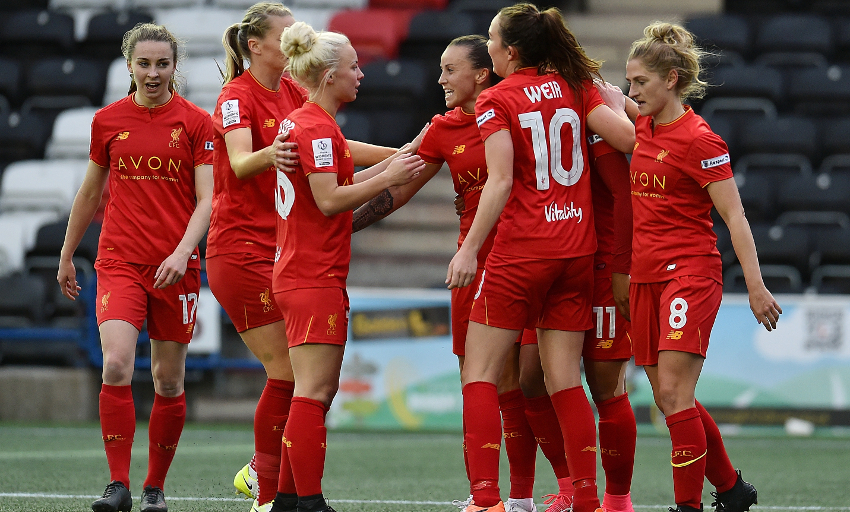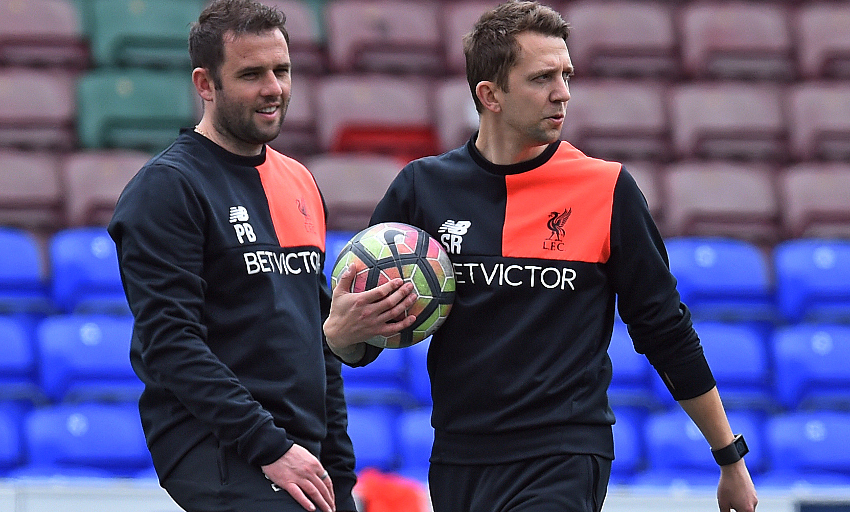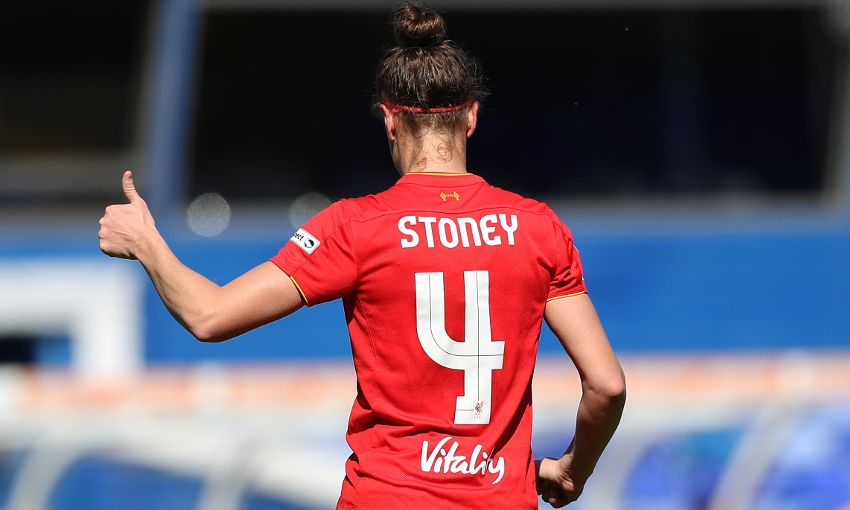'I joined LFC to challenge the environment in a positive way'
So much has changed in the women's game from the earliest days of Casey Stoney's career.
Two decades have passed since the defender stepped up to top-level football, 20 years that have involved spells with teams such as Arsenal, Chelsea and Charlton, 129 England caps and multiple international tournaments.
Challenges have been a running theme of Stoney’s life – professionally and personally – and last December, the 35-year-old was sufficiently intrigued by the prospect of yet another with Liverpool Ladies that she joined Scott Rogers’ side.
“I’m a dinosaur in comparison to some of the young girls here,” she tells Liverpoolfc.com with self-deprecation and a smile.
That quip aside, though, a conversation with the MBE reveals there is nothing but total belief in the potential benefits of using her experience to influence the developing group of players under Rogers’ wing.
“He knows that I’ll challenge the environment, probably challenge him a little bit and I’ll challenge the players,” says Stoney.
“At the same time, I’d always believe in doing that in a positive way – never come with a problem, always come with a solution. I want to help.
“We are a young team, we can’t hide that, and he signed me because he needed the experience and he wanted experience. I think I bring that.
“There’s no point me being here if I don’t help the young players to develop or I don’t help them in terms of big games and passing on advice.
“I’m sure I’m going to make mistakes in my first season in terms of dealing with people and managing people, but that’s what it’s all about – and I suppose helping Scott to create an environment where we’re really, really raising the standards.”

Stoney’s Reds debut was delayed by a hamstring injury, with a subsequent setback forcing a short spell on the sidelines last month too.
But, collectively, the Ladies have fared well since the FA WSL Spring Series got under way in April, navigating their opening four matches without defeat and winning three.
A healthy haul of 14 goals have brought victories over Yeovil Town, Reading and Birmingham, with a 4-4 thriller at Arsenal the only game Rogers’ charges have yet to take maximum points from.
Their No.4 is now back in action again as well, featuring alongside the captain, Gemma Bonner, in central defence for each of the past two encounters.
Encouraging outcomes on the pitch so far have been matched by what Stoney has witnessed behind the scenes since arriving on Merseyside. “You’re either part of the club or apart from the club,” she notes. “The women’s team here is very much a part of the club.”
Rogers was ‘one of the main reasons’ the centre-back relocated to Liverpool and the appeal of helping to successfully implement his strategy has only grown now that the England international is here.
“I had a couple of clubs that had spoken to me. But Scott stood out head and shoulders really in terms of the attention to detail he does in terms of his planning, his content and his coaching,” explains Stoney.
“And it was his honesty – he didn’t try to make the club something it wasn’t, he didn’t try to lie to me, he was very honest and I really appreciated that.
“And it seemed like this was a really together team, and that’s what I really wanted to be part of – a nice environment where I can continue to learn and develop and be part of something. Scott wants to grow a project here and he was very keen for me to be involved.
“Scott is trying to implement new ideas and new ways of playing this season.
“I look at Shanice van de Sanden, for instance, and she is unbelievable. She is one of the quickest players I’ve ever seen in my life. If we can utilise her pace and we can get our ball players on the ball…
“Also, I’m a defender, so you have to pride yourself on doing the basics really well and doing the ugly things really well. Defending, for me, is an art.
“People think it’s boring, but if we can pride ourselves on having the best back five in the country then we’ve got a chance of winning things.”

Our chat broadens beyond the immediate objectives of Rogers, Stoney and Liverpool Ladies, to her long-term plans, the current status of women’s football and how the sport and society may change for the better in the future.
She is wisely studying for her coaching badges already, and that aforementioned smile returns upon admitting: “I wish I could play forever but I’m not Peter Pan. The next best thing to playing is coaching and getting on the grass.”
Her care for the game extends to the stands, too, and, specifically, ways in which to ensure supporters attend in greater numbers and with more regularity in the years ahead.
“There’s a lot of work to do to keep the game moving in the right direction. We want to get to a point where it’s sustainable,” the former England captain says.
“We need to get more fans on seats. We need to drive the game in the communities, get more people out watching and playing the game, and just continue the interest really, because if the fan base isn’t there then it’s not sustainable.
“As much as we’re professional, we also need to remember we’ve got a lot of work to do as players to keep making sure the advert is good enough on the pitch to watch and that people want to keep paying to come back and watch us play.
“It’s about changing perceptions.
“You want little boys growing up knowing that it’s normal for girls to play football and therefore when they become fathers it’s normal to encourage the girls to play and also to take their children to watch female games. And I think that’s happening.
“People want to watch winning teams. If we can keep winning at the international level, it will keep filtering down.
“If we can keep being successful at club level at Liverpool, more people will come and watch. Man City proved that last year, 4,000 people watching a league game – because they were winning. That’s really part of it.
“I would like my little boy and girl to have exactly the same opportunities. So, she can be a full-time professional. It isn’t a dream that can’t happen. Don’t get me wrong, you have to work hard. That’s like anything in life.
“I’d love to see in 15 years’ time that perceptions are completely different and it’s a norm for a girl to play football in school as it is a boy.
“She can have a career in football if she wants it. Just generally, equality, and that’s not just in football – that’s generally in life.
“I’d like to think in 15 years’ time, no matter what she wants to do, she’ll have the support and the same opportunity to do it. A lot has got to change, a hell of a lot. Not just in football, but in society. I can hope.”



